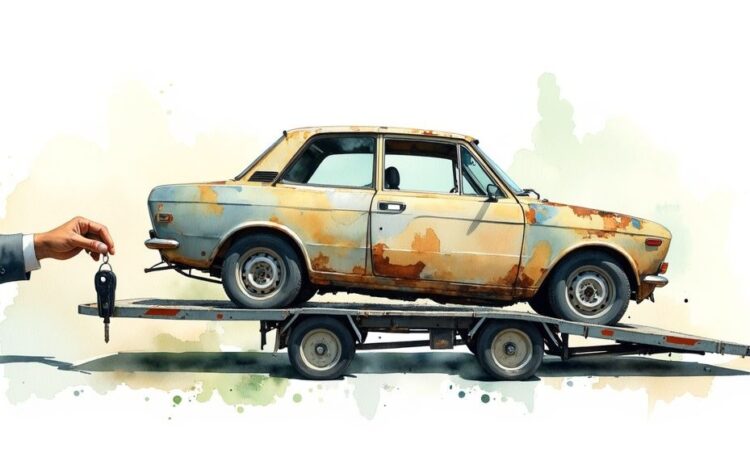
Cars Collected for Scrap Get the Best Price
Let's be honest, deciding to scrap your car often comes down to a gut-wrenching moment. You're staring at a failed MOT certificate, or a repair quote that's worth more than the car itself. When keeping your vehicle on the road starts feeling like throwing money into a black hole, arranging for it to be collected for scrap is usually the smartest move you can make.
Deciding When It's Time to Scrap Your Car
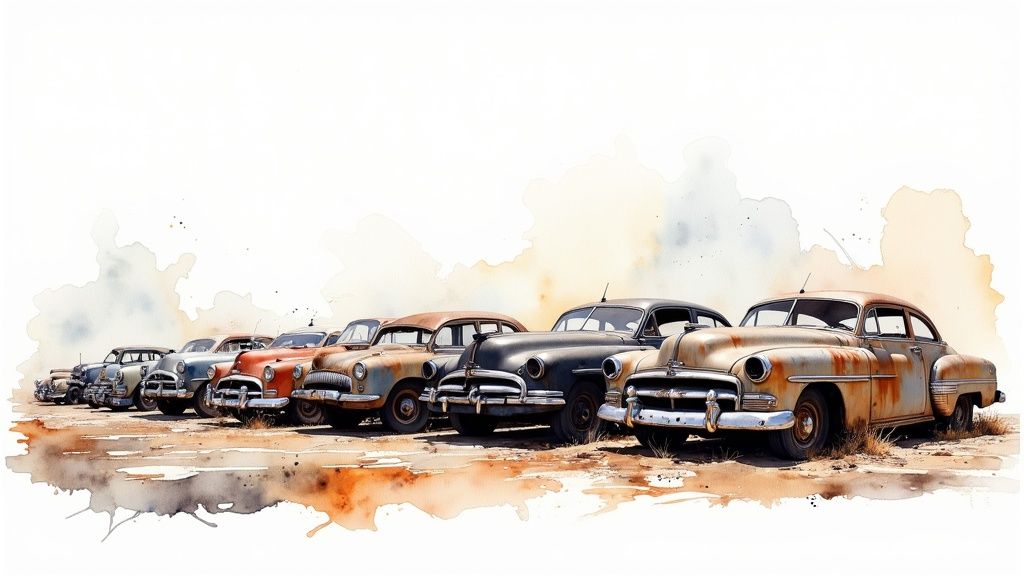
Every car has a shelf life. That tipping point arrives when the cost to keep it running far outweighs its practical value. We're not just talking about one big repair bill here; it’s the slow, painful accumulation of issues that make your car unreliable, unsafe, or just plain uneconomical to drive.
It's easy to get attached to a car, but learning to spot these red flags helps you make a clear-headed decision. A vehicle that keeps failing its MOT, is riddled with rust that compromises its frame, or suffers from chronic engine or gearbox trouble is a perfect candidate for the scrapyard. These aren't minor tweaks—they're giant warning signs that your car has become a financial liability.
Key Indicators for Scrapping Your Car
So, how do you know for sure that it's time to say goodbye? There are a few dead giveaways that scrapping is your best path forward.
- Repair Costs Exceed the Car's Value: This is the most common reason. If a mechanic gives you a quote that's higher than what the car is actually worth, it’s a no-brainer. Sometimes even smaller, related costs can tip the scales; for instance, understanding car key replacement costs on an older vehicle can be surprisingly high and add to the overall financial burden.
- Major MOT Failures: Some MOT failures are simple fixes, but others are catastrophic. If your car fails due to structural rust, serious emissions problems, or a major component failure, the cost to get it road-legal can be astronomical.
- Serious Safety Concerns: This one is non-negotiable. If you're dealing with failing brakes, a compromised chassis, or steering that feels unpredictable, the car is a hazard. Your safety, and the safety of others, is worth more than any car.
I've put together this quick checklist to help you see if your car's problems really point towards the scrapyard.
Quick Checklist for Scrapping Your Car
| Symptom or Issue | Why It Points to Scrapping | Is Scrapping a Good Option? |
|---|---|---|
| Engine or Gearbox Failure | Can cost thousands to repair or replace, often more than the car's total value. | Yes, this is a classic reason to scrap. |
| Severe Rust or Corrosion | Compromises structural integrity, making the car unsafe and very expensive to fix. | Yes, especially if it's a structural MOT failure. |
| Persistent Electrical Faults | Extremely difficult and costly to diagnose and repair, often leading to unreliability. | Very likely, as costs can quickly spiral. |
| Head Gasket Failure | A major engine repair that is almost always uneconomical for an older vehicle. | Yes, it's one of the clearest signs. |
| Post-Accident Write-Off | If your insurer declares it a write-off (Cat S/N), scrapping is often the simplest solution. | Yes, a straightforward and common choice. |
This table isn't exhaustive, but if your car ticks one or more of these boxes, it’s a strong signal that scrapping is the right financial and practical decision.
Letting an old, unreliable car take up valuable space on your drive isn't just an inconvenience—it's a missed opportunity to responsibly recycle materials and get paid for it. Making the call to scrap is a proactive financial and environmental decision.
More and more people are reaching the same conclusion. In 2024, the UK officially scrapped over 1.2 million vehicles, and that number is expected to climb into 2025 as emissions standards get tighter. This just goes to show how vital a responsible, efficient scrap industry is. By choosing a licensed service for cars collected for scrap, you ensure your old vehicle becomes part of this sustainable cycle.
Navigating the Essential DVLA Paperwork
Getting the paperwork right when you scrap your car is more than just ticking boxes. It’s a crucial legal step that protects you from any future headaches, like fines or penalties. The key document here is your V5C logbook, sometimes called the vehicle registration certificate. Think of it as your car's passport—it proves you're the registered keeper and is absolutely essential for a smooth handover.
When the collection driver turns up, you’ll need to fill out a specific part of the V5C. On newer logbooks (the ones with the multi-coloured blocks on the front), you're looking for Section 4: Disposing of this vehicle to a motor trader, insurer or dismantler. If you have an older, blue V5C, it's Section 9. You give the main document to the driver, but make sure you tear off the little slip and keep it safe. That's your immediate proof of the transfer.
What If My V5C Is Missing?
It happens. Logbooks go missing all the time, so don't worry if you can't put your hands on it. You can still get your car collected and scrapped. The one thing you will need to provide is some other proof that you own the car. A valid photo ID, like your driving licence or passport, usually does the trick.
Without the V5C, you have one extra job to do: you must tell the DVLA in writing that you’ve sold the vehicle. Just send them a letter with all the key details:
- Your full name and address.
- The car's registration number, make, and model.
- The exact date you handed it over.
- The name and address of the scrap company (the Authorised Treatment Facility).
Sending this letter is your way of making sure the DVLA’s records are updated, officially taking the car out of your name. It’s a simple step that saves a lot of potential hassle down the line.
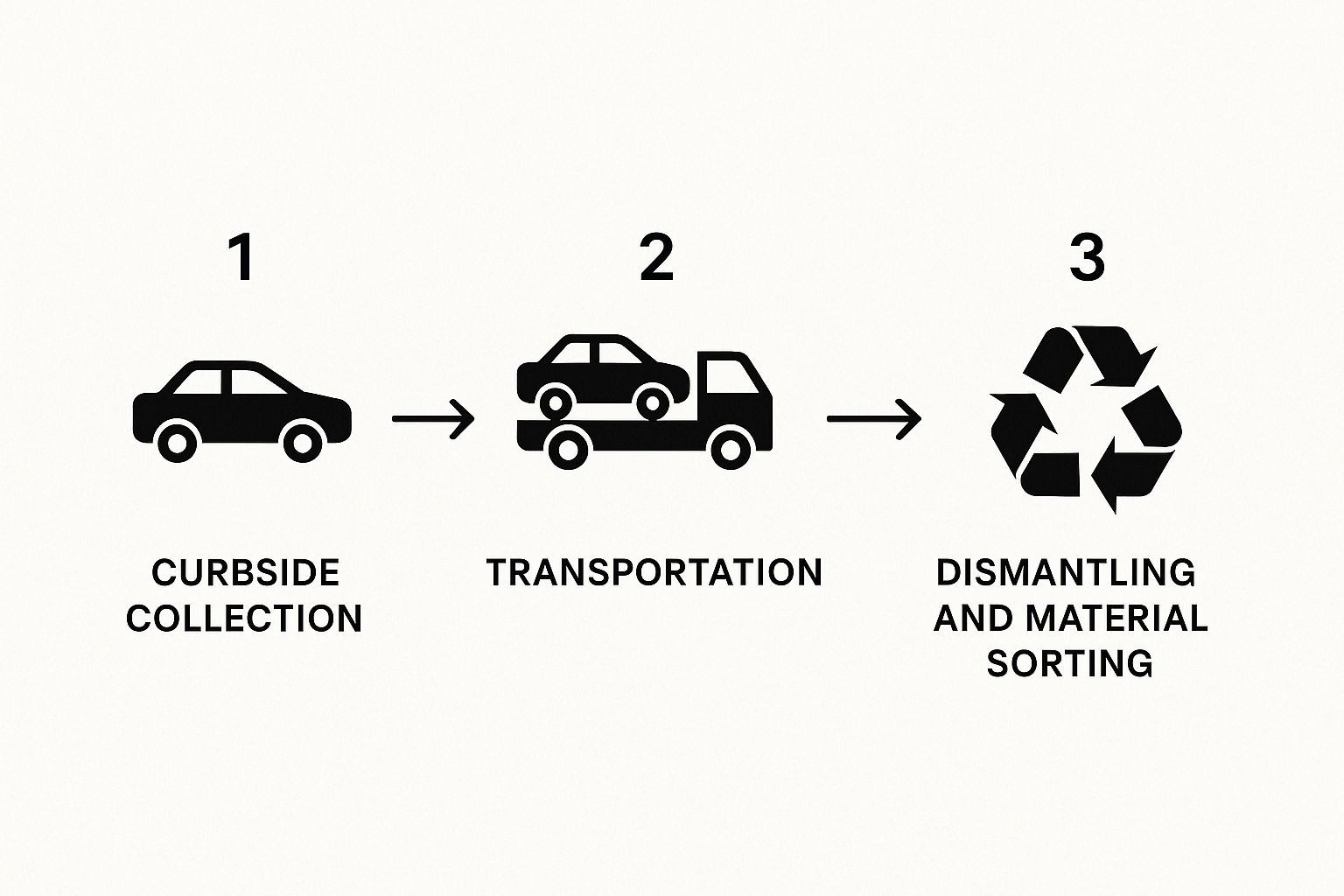
Once the paperwork is sorted, your car begins its final journey, an efficient and organised process that sees it responsibly recycled.
Your Final Proof: The Certificate of Destruction
After your vehicle arrives at a licensed Authorised Treatment Facility (ATF) and is properly processed, they will issue a Certificate of Destruction (CoD). This is the big one. It's your official, legally binding proof that the car is off the road for good, and it should arrive within seven days.
The Certificate of Destruction is your ultimate protection. It confirms to the DVLA that you are no longer responsible for the vehicle, preventing any future fines for tax, MOT, or insurance.
Hang onto this certificate. It’s the final piece of the puzzle that proves you've done everything by the book. Without it, you could technically still be held liable if the car somehow ended up back on the road. Any reputable scrap service will make sure you get one, no questions asked.
It's also good to remember that having your paperwork in order helps ensure a smooth process for getting the best price. To get a better idea of what your car might fetch, you can learn more about how much your car's scrappage value is right here on our site. Sorting the V5C is the final step to getting paid and closing the book on your old car, responsibly.
How to Get the Best Price for Your Scrap Car
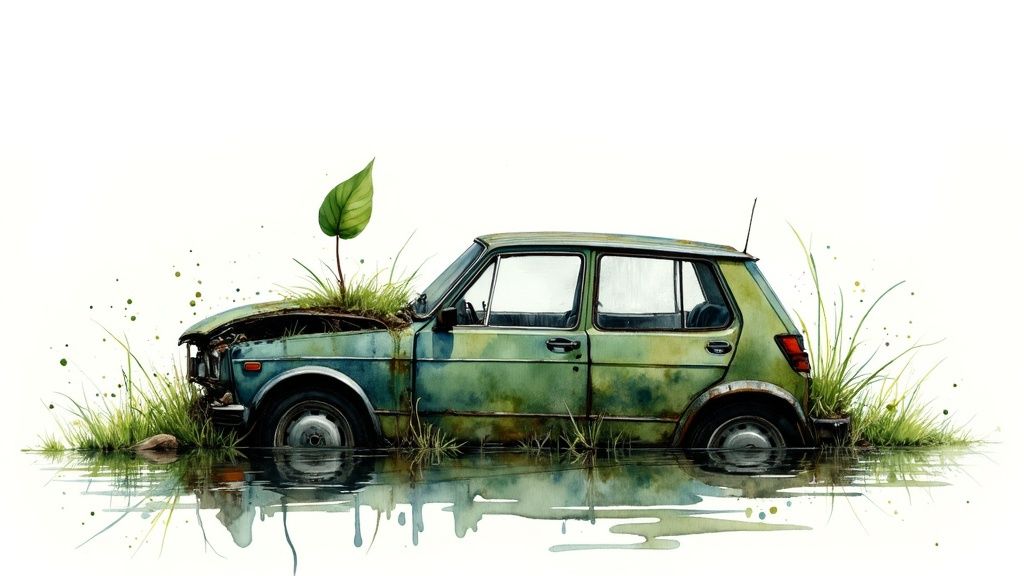
Most people write off an old, non-running car as basically worthless, but that couldn’t be further from the truth. Several key factors determine its final value, and knowing a bit about them can genuinely boost your payout. When you arrange for cars collected for scrap, the price you're offered isn't just a number plucked out of thin air; it’s a careful calculation based on weight, make, model, and any parts that can be salvaged.
The biggest piece of the puzzle is almost always the car’s weight. Scrap metal, especially steel, is a commodity, and its price goes up and down with the market. It stands to reason that a heavier vehicle, like a big estate car or a van, has a lot more metal and will fetch a higher price than a little city runabout. This is the baseline for almost every quote.
But it's not just about the raw metal. Certain parts can add quite a bit of value if they're in decent, reusable shape. These are often stripped and sold on the second-hand market before the main shell gets crushed.
Maximising Your Vehicle's Value
To make sure you’re getting the best offer on the table, it helps to think about what makes your car valuable to a recycler. You don't need to start taking it apart yourself, but understanding where the value is hiding is key.
- Valuable Components: The catalytic converter is famous for being a high-value part because of the precious metals inside. But don't forget other bits like alloy wheels, alternators, starter motors, and even a well-maintained engine or gearbox. These can all be salvaged and resold.
- Completeness Matters: It's almost always best to leave the car whole. While it might be tempting to sell the catalytic converter separately, many scrap services will lower their quote if key parts are missing—sometimes by more than you got for the part itself. An intact car is just easier and often more profitable for them to process.
- Market Fluctuations: Metal prices can change daily. For instance, data from early 2025 showed that UK scrap car prices settled at an average of £227. This was after a dip to £223 in January before they bounced back. These changes are driven by global steel demand and trade, which is why getting a few different quotes is so important. You can read more about recent scrap car price trends on atfpro.co.uk.
The Power of Shopping Around
The single most effective thing you can do to get a fair price is to get quotes from several different Authorised Treatment Facilities (ATFs). Never, ever take the first offer you get. Prices can vary dramatically from one company to the next.
One of the biggest mistakes people make is accepting the first quote they're given out of convenience. Spending just a few minutes comparing offers can often add another £20-£50 to your pocket.
When you ask for a quote, be upfront and honest. Give accurate details about the car's condition, whether it starts, and if any major parts have been removed. This transparency means the price you’re quoted is the price you’ll actually be paid, avoiding any awkward haggling when the collection truck shows up.
For a complete walkthrough of the entire journey, from getting a quote to waving goodbye to your car, check out our detailed guide on how to scrap your car. By understanding these simple factors and comparing your options, you put yourself in a much stronger position to get a great deal.
Right, you've got your quote, sorted the paperwork, and booked the collection. The finish line is in sight! The last thing to do is a bit of prep work on the car itself to make sure the handover is completely seamless. A few minutes spent now will mean a much smoother, professional experience when the recovery truck pulls up.
This isn't about getting the car showroom-ready, of course. But you absolutely must have a good rummage through for any personal belongings. It's truly surprising what we leave behind in our cars over the years. Check all the obvious places first – the glove box, door pockets, and under the seats are classic spots.
Don't stop there, though. Pop the boot and check the spare wheel well, and have a poke around in any of those hidden storage compartments some cars have.
Clearing Out and Final Checks
Once you're confident you’ve rescued all your personal bits and bobs—old CDs, sunglasses, forgotten documents, and that rogue shopping bag—a couple of other questions usually come up. A big one is whether you need to drain fluids like oil or petrol.
The answer is a simple one: no. Leave all the fluids exactly where they are. Proper Authorised Treatment Facilities (ATFs) have all the specialised kit to depollute the vehicle safely and legally. Trying to do it yourself is not only incredibly messy but can also be dangerous.
What about the number plates? People often ask if they should take them off. Again, the answer is no – leave them on the car. The scrap yard needs them to identify the vehicle correctly when they process it and issue the all-important Certificate of Destruction. Taking them off can just create headaches and delays with the DVLA paperwork.
Lastly, have a think about where the car is. The whole process of getting cars collected for scrap is much, much faster if the recovery driver can actually get to your vehicle without a fuss.
Making Access Easy for the Driver
A smooth collection really hinges on the driver being able to safely get to and load your car. If your vehicle is tucked away in a tricky spot, a bit of forward-thinking can make all the difference on the day.
Think about these common situations:
- Tight Driveway: If you can, shuffle any other cars out of the way. Shifting things like wheelie bins can also clear a surprising amount of space for the recovery truck.
- Soft Ground: Is the car parked on a lawn that's turned into a bit of a bog, or a muddy patch? It’s a great idea to give the collection company a heads-up. They might need to bring extra gear like winch extension cables or ground mats to avoid getting stuck.
- Locked Gates or Garages: Make sure any gates are unlocked before the driver arrives. If the car is in a garage, have the keys ready. Remember, if it's a non-runner, it'll need to be pulled out, so a clear, straight path is a massive help.
Taking these simple steps isn't just about making the driver's job easier; it guarantees your collection day is as quick and painless as possible. An empty car and easy access mean the whole thing can be over in minutes, letting you get on with the rest of your day.
Finding a Reputable Car Collection Service
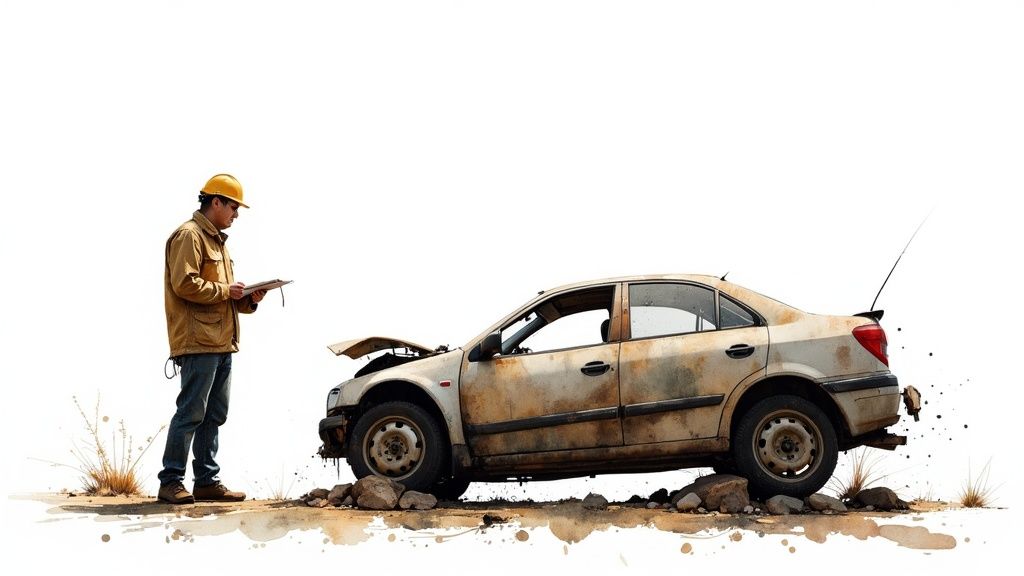
Deciding who actually comes to collect your scrap car is arguably the most critical part of this whole process. It's not just about getting the best price—it's about making sure everything is done by the book to protect yourself from legal headaches down the road.
Go with an unlicensed operator, and you could be opening yourself up to a world of trouble. Think unexpected fines, or even finding out your old car has been illegally dumped somewhere. It happens more than you’d think.
The only safe bet in the UK is to use a government-certified Authorised Treatment Facility (ATF). These are the only businesses legally allowed to process and scrap end-of-life vehicles. Using a registered ATF is your guarantee that the car will be handled correctly, following strict environmental laws, and that you'll get the proper paperwork to prove it.
How to Check a Service is Legit
So, how do you know if you’re dealing with a genuine ATF? Thankfully, you don't just have to take their word for it. The Environment Agency keeps a public register where you can look up any company's waste carrier licence in a matter of seconds.
Just ask for their licence number and check it yourself. Any reputable company will give it to you without a second thought. If they get shifty or can't provide one, that's a massive red flag. Walk away. This simple check is your best defence against rogue traders.
The UK's vehicle recycling industry is tightly regulated for a reason. These standards have helped us hit an impressive 86.5% scrap car recycling rate, which is fantastic news for the environment. It all comes down to the strict rules ATFs have to follow. You can discover more insights about UK recycling rates on scraplocal.co.uk.
Red Flags to Watch Out For
Besides verifying their licence, there are a few other warning signs that should set alarm bells ringing. One of the biggest? An offer to pay you in cash.
Under the Scrap Metal Dealers Act 2013, it is illegal for any scrap metal dealer to pay for a car in cash. This law was brought in to clamp down on metal theft. A legitimate service will always pay you via a secure bank transfer or a business cheque.
If a collector is pushing for a cash deal, they’re breaking the law, and you can be almost certain they aren't an ATF. Don't even consider it. By choosing a certified service, you not only stay on the right side of the law but also support a system that keeps things safe and sustainable. It also helps you get a clearer picture of who buys scrap cars legally and what you should expect from a professional outfit.
To help you spot the difference, here's a quick comparison of what to expect from a licensed professional versus a dodgy operator.
Licensed ATF vs Unlicensed Operator
This table breaks down the key differences, so you know exactly what you're looking for and what to avoid.
| Feature | Licensed Authorised Treatment Facility (ATF) | Unlicensed Operator |
|---|---|---|
| Legal Status | Fully licensed and regulated by the Environment Agency. | Operates illegally without the required licences. |
| Payment Method | Pays via traceable bank transfer or business cheque. | Often offers cash, which is illegal. |
| Paperwork | Issues an official Certificate of Destruction (CoD). | Cannot provide a CoD, leaving you legally liable. |
| Environmental Impact | Depollutes and recycles vehicles to strict standards. | May dump hazardous waste or illegally sell parts. |
| Peace of Mind | Your car is processed responsibly, and you are protected. | High risk of fines, fly-tipping, and future legal trouble. |
Choosing an ATF is the only way to get your hands on a Certificate of Destruction (CoD). This document is your official proof that the vehicle has been taken off the road for good and is no longer your responsibility. Without it, you’re leaving yourself wide open to future problems.
Common Questions About Scrapping a Car
Even after you’ve ticked all the boxes, it’s completely normal to have a few last-minute questions before the tow truck arrives. You’re not alone. Let’s walk through some of the most common queries we hear from people, so you can feel totally confident about the final handover.
Do I Have to Be There for the Collection?
Ideally, yes. It makes everything much simpler if you or someone you trust can be there to hand over the keys and the V5C logbook. This way, you get the peace of mind that comes from seeing the process through to the end and knowing your car is in the right hands.
But life gets in the way, we get it. Many professional collection services offer flexible, contactless options if you can't be there. You can usually arrange to leave the keys and signed paperwork in a secure, pre-agreed place for the driver. Just make sure you confirm this arrangement with them beforehand.
What if I Cannot Find My V5C Logbook?
Don’t panic—a lost V5C is a very common problem, and it won't stop you from scrapping your car. You can absolutely proceed without it. The driver will just need to see some photo ID, like your driving licence or passport, to confirm you’re the legal owner.
The one crucial thing you must do, however, is inform the DVLA in writing that you've sold the vehicle to a scrap yard. Your letter needs to include your details, the car's registration number, and the full name and address of the scrap company. This officially takes the car out of your name.
A missing V5C is a small hiccup, not a roadblock. A good scrap service will know exactly how to handle this and can guide you on what to include in your letter to the DVLA.
How Will I Get Paid for My Scrap Car?
This is a really important one. Thanks to the Scrap Metal Dealers Act of 2013, it is illegal for any scrap car dealer in the UK to pay you in cash. This law was brought in to clamp down on metal theft by making sure every transaction is traceable.
Payment will always be made by a secure bank transfer or a business cheque. Usually, the payment is sent the same day as the collection, though it might take a business day to land in your account. If any company offers you cash, treat it as a major red flag – they are not a legitimate, licensed operator.
Can I Get a Refund on My Unused Road Tax?
Yes, absolutely! As soon as the DVLA is officially notified that your car has been scrapped (either through the V5C slip or your letter), they will automatically issue a refund for any full months of road tax you have left.
You don't have to fill out any extra forms or chase them up. The DVLA calculates what you’re owed and posts a cheque to the address where the vehicle was registered. It’s a nice little bonus for doing things by the book.
Ready to turn your old car into cash with a trusted, professional service? Fast Scrap Car offers a hassle-free experience with fair prices, same-day collection across London and Surrey, and instant, secure payment. Get your free, no-obligation quote today.
